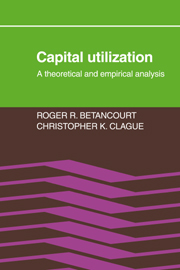Book contents
- Frontmatter
- Contents
- List of tables and figures
- List of propositions
- Preface
- Glossary of symbols
- Introduction
- 0 A preliminary view of capital utilization
- Part I Shift-work and the theory of the firm
- 1 Cost minimization
- 2 Specific functional forms: additional results
- 3 Profit maximization
- Part II Estimation
- Part III Results
- Part IV Implications
- References
- Index
2 - Specific functional forms: additional results
Published online by Cambridge University Press: 05 March 2012
- Frontmatter
- Contents
- List of tables and figures
- List of propositions
- Preface
- Glossary of symbols
- Introduction
- 0 A preliminary view of capital utilization
- Part I Shift-work and the theory of the firm
- 1 Cost minimization
- 2 Specific functional forms: additional results
- 3 Profit maximization
- Part II Estimation
- Part III Results
- Part IV Implications
- References
- Index
Summary
In this chapter we shall delve more deeply into the decision to work shifts; this will be done with the aid of specific assumptions about the productive process. The most important of these assumptions is the use of a constant elasticity of substitution (CES) production function (Arrow et al. 1961) throughout the chapter to describe the extent of ex-ante substitution possibilities between capital and labor services. Specific functional forms are also relied on to investigate more thoroughly other aspects of the productive process that are potentially important in the decision to work shifts. Finally, we also find specific functional forms to be indispensable in our subsequent empirical analysis. Thus this chapter provides the functional forms of the cost ratio that will be implemented empirically.
In the next section the CES functional form will be employed to describe ex-ante substitution possibilities in the cost-minimization model of Chapter 1. The CES assumption has already been used in the shift-work literature by Winston (1974a) and Betancourt and Clague (1975), among others. We shall follow the approach used in the latter reference because it facilitates separation of the influence of capital intensity from that of ex-ante substitution possibilities as causal factors in the shift-work decision. This separation also highlights the role of the elasticity of substitution in modifying the effect of factor prices on shift-work.
- Type
- Chapter
- Information
- Capital UtilizationA Theoretical and Empirical Analysis, pp. 24 - 43Publisher: Cambridge University PressPrint publication year: 1981



